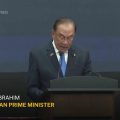The ongoing trade war between the US and China continues to cast a long shadow over Chinese businesses, particularly exporters. Recent reports from the Canton Fair, China’s largest trade fair, paint a picture of significant disruption and uncertainty. Exporters are facing stalled shipments and are forced to lower their sales forecasts, a direct consequence of the US tariffs imposed on Chinese goods.
The impact is palpable. Many exhibitors at the fair spoke of deals falling through or being significantly delayed due to the added costs and complexities of navigating the tariff landscape. This isn’t just about immediate losses; it’s about a chilling effect on future investment and growth. The uncertainty surrounding the trade relationship is making it difficult for businesses to plan for the long term, leading to hesitancy in making crucial decisions regarding production, expansion, and hiring.
Beyond the immediate financial impact, the tariffs are creating a ripple effect throughout the Chinese economy. Smaller businesses, often lacking the resources to absorb the increased costs, are particularly vulnerable. This could lead to job losses and a slowdown in economic growth, not just in China, but potentially globally given China’s prominent role in the international supply chain.
While some argue that the tariffs are a necessary tool to protect domestic industries, the human cost for Chinese exporters is undeniable. The stories emerging from the Canton Fair highlight the real-world consequences of protectionist policies, illustrating how trade disputes can disrupt livelihoods and create widespread economic instability. The situation underscores the need for a swift resolution to the trade war and a renewed focus on cooperation and mutually beneficial trade agreements.










